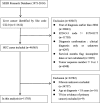Does fibrosis have an impact on survival of patients with hepatocellular carcinoma: evidence from the SEER database?
- PMID: 30445928
- PMCID: PMC6240175
- DOI: 10.1186/s12885-018-4996-z
Does fibrosis have an impact on survival of patients with hepatocellular carcinoma: evidence from the SEER database?
Abstract
Background: Liver fibrosis is involved in hepatocellular carcinoma (HCC), but its effect on the survival of patients with HCC remains controversial. This study aims to explore whether the severity of liver fibrosis has an impact on HCC overall survival (OS) and disease-specific survival (DSS) in Surveilance, Epidemiology, and End-Results (SEER) database.
Methods: A total of 11,783 HCC patients diagnosed between 2004 and 2014 from SEER database were enrolled. Cox proportional hazard regression models were used to estimate crude and adjusted hazard ratios (HRs) with 95% confidence intervals (CIs) for fibrosis group associated with survival. Decision curve analysis (DCA) was also performed to compare the effect of fibrosis with other clinicopathological characteristics for survival outcome.
Results: Patients with high fibrosis score (5-6) had a greater proportion than those with low fibrosis score (0-4) (80.3% vs. 19.7%). Fibrosis score was an independent prognostic factor for OS (HR = 1.09, 95%CI: 1.02-1.16), but not for DSS (HR = 1.05, 95%CI: 0.98-1.13) by multivariate Cox proportional hazard models. Additionally, there was no significant effect of liver fibrosis on OS and DSS with stratification of TNM stage and therapy. Findings of DCA showed that fibrosis was less associated with survival outcome in comparison with other tumor characteristics.
Conclusions: The effect of fibrosis on HCC survival was less important than that of other clinicopathological characteristics (like TNM stage or tumor size).
Keywords: Decision curve analysis; Hepatocellular carcinoma; Liver fibrosis; SEER database; Survival.
Conflict of interest statement
Ethics approval and consent to participate
The data in this study was obtained from SEER database and National Cancer Institute had given us permission to access data for researching (Reference number: 11114-Nov2016). Given that SEER data is de-identified and ethics approval is waived, this study was exempted from Institutional Research Board review.
Consent for publication
Not applicable.
Competing interests
The authors declare that we have no competing interests.
Publisher’s Note
Springer Nature remains neutral with regard to jurisdictional claims in published maps and institutional affiliations.
Figures


Similar articles
-
Survival improvement and prognosis for hepatocellular carcinoma: analysis of the SEER database.BMC Cancer. 2021 Oct 29;21(1):1157. doi: 10.1186/s12885-021-08904-3. BMC Cancer. 2021. PMID: 34715816 Free PMC article.
-
Fibrosis score impacts survival following resection for hepatocellular carcinoma (HCC): A Surveillance, End Results and Epidemiology (SEER) database analysis.Asian J Surg. 2018 Nov;41(6):551-561. doi: 10.1016/j.asjsur.2018.01.001. Epub 2018 Feb 14. Asian J Surg. 2018. PMID: 29454570
-
Neoadjuvant radiotherapy provided survival benefit compared to adjuvant radiotherapy for hepatocellular carcinoma.ANZ J Surg. 2018 Oct;88(10):E718-E724. doi: 10.1111/ans.14387. Epub 2018 Feb 5. ANZ J Surg. 2018. PMID: 29399938
-
Neutrophil to Lymphocyte Ratio and Platelet to Lymphocyte Ratio as Prognostic Predictors for Hepatocellular Carcinoma Patients with Various Treatments: a Meta-Analysis and Systematic Review.Cell Physiol Biochem. 2017;44(3):967-981. doi: 10.1159/000485396. Epub 2017 Nov 27. Cell Physiol Biochem. 2017. PMID: 29179180 Review.
-
The clinical utility of the proliferating cell nuclear antigen expression in patients with hepatocellular carcinoma.Tumour Biol. 2016 Jun;37(6):7405-12. doi: 10.1007/s13277-015-4582-9. Epub 2015 Dec 17. Tumour Biol. 2016. PMID: 26676639 Review.
Cited by
-
Risk factors and predictive nomograms for early death of patients with advanced hepatocellular carcinoma: a large retrospective study based on the SEER database.BMC Gastroenterol. 2022 Jul 19;22(1):348. doi: 10.1186/s12876-022-02424-5. BMC Gastroenterol. 2022. PMID: 35854221 Free PMC article.
-
Development and Identification of a Nomogram Prognostic Model for Patients with Primary Clear Cell Carcinoma of the Liver.Med Sci Monit. 2020 Jan 23;26:e919789. doi: 10.12659/MSM.919789. Med Sci Monit. 2020. PMID: 31969554 Free PMC article.
-
Impact of liver fibrosis score on prognosis after common therapies for intrahepatic cholangiocarcinoma: a propensity score matching analysis.BMC Cancer. 2020 Jun 15;20(1):556. doi: 10.1186/s12885-020-07051-5. BMC Cancer. 2020. PMID: 32539768 Free PMC article.
-
Risk scoring based on expression of long non‑coding RNAs can effectively predict survival in hepatocellular carcinoma patients with or without fibrosis.Oncol Rep. 2020 May;43(5):1451-1466. doi: 10.3892/or.2020.7528. Epub 2020 Feb 18. Oncol Rep. 2020. PMID: 32323856 Free PMC article.
-
Lymphoepithelial carcinoma of the oral cavity and pharynx: a SEER population-based cohort study.Am J Transl Res. 2023 Apr 15;15(4):2716-2726. eCollection 2023. Am J Transl Res. 2023. PMID: 37193188 Free PMC article.
References
MeSH terms
Grants and funding
LinkOut - more resources
Full Text Sources
Medical

